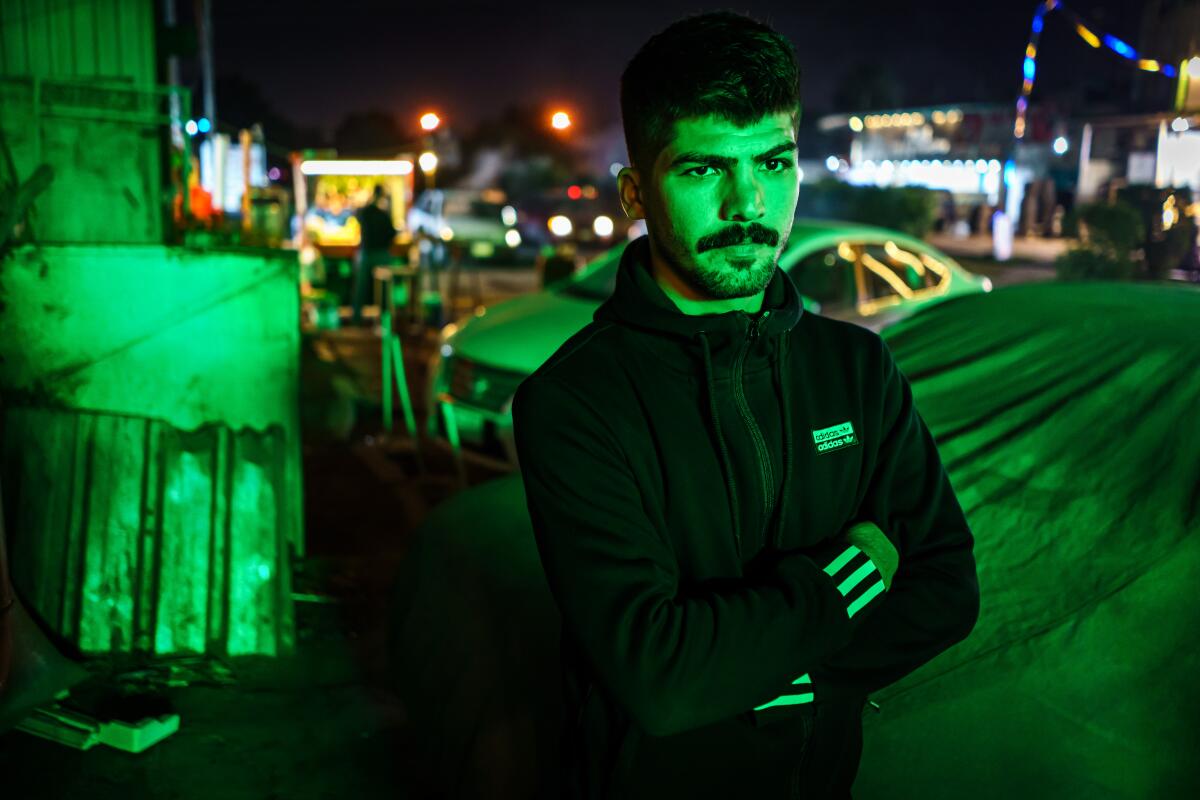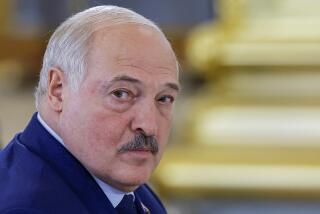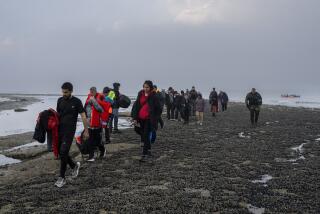‘We were like a football,’ Iraqi migrant says after Belarus odyssey

- Share via
BAGHDAD — Sitting in a two-room apartment above his uncle’s office, 25-year-old Hussein Shumari said there wasn’t much left for him in Iraq. He had graduated from law school two years before but still had no job. He had lived through war and sectarian violence, but when his brother died of the coronavirus this year, it broke him.
“My soul died with him,” he said. “I couldn’t imagine staying. I felt it was time to go and do something.”
When he heard in September that Belarus — a potential pathway to Europe — was granting visas to Iraqis, he sold what few belongings he had, borrowed money from a friend of his uncle’s and handed $3,500 to a Baghdad travel agency. By the end of October, he was on a plane to the Belarusian capital, Minsk, and, he hoped, “a better life ... a good life.”
Instead, he found himself on the front lines of the latest skirmish between Belarus and its European neighbors. Belarusian President Alexander Lukashenko, a despot facing increasing international isolation, retaliated against the European Union by funneling thousands of migrants and refugees mostly from Iraq, Syria and Yemen to his country’s borders with Latvia, Lithuania and Poland.
Lukashenko’s weaponization of the dispossessed, such as Shumari, was part of a wider, years-long migrant crisis that has rocked Western nations, with a resurgence in right-wing groups espousing anti-immigration policies known as “Fortress Europe.”
The route through Belarus appeared a safer prospect than the often-deadly sea crossings toward Europe’s shores. Since 2014, more than 22,000 migrants have drowned in the Mediterranean alone; that’s probably an undercount since many bodies are never found. On Thursday, 31 migrants drowned while crossing the English Channel toward Britain.
On paper, young men such as Shumari shouldn’t be in the ranks of the migrant masses. With more than 143 billion barrels of oil, Iraq ranks fifth highest in proven oil reserves, representing about 9% of the world’s supply. But the scale of its riches is more than matched by a wildly corrupt political class that leaves most Iraqis all but destitute.
After landing in Minsk, Shumari contacted a smuggler he found on a Telegram instant messaging group who promised he could get him to Germany if he made it to Poland.
Shumari paid $200 for a taxi to ferry him to Belarus’ western edge and, with 10 others in tow, reached the border fence. Someone in the group tried to breach
the fence with a wire cutter. Belarusian soldiers showed up, beating the migrants with batons and corralling them into Russian-made VAZ trucks before dumping them in a field near the city of Grodno, a few miles east of the Polish border.
It was the start of what Shumari described as a surreal odyssey through a no man’s land marked by migrants huddled against the falling temperatures of an approaching winter and a cycle of beatings and harassment on both sides of the border. Blankets, shoes and a few children scattered in the mud.
At dawn, a pair of Belarusian soldiers roused the migrants and escorted them through swampland with water up to their knees until they reached a spot where a 12-foot-wide river separated the two countries. A third soldier kept a lookout. The migrants were forced to use an inflated inner tube to cross the waterway.
Once on the other side, Shumari and the others trudged through forest but soon found themselves surrounded by trained dogs whose barking alerted nearby Polish soldiers, who rounded up the migrants, confiscated their phones and drove them in trucks to the river on the border.
“They didn’t care how cold it was. They just pointed at the river and said, ‘Swim,’” Shumari said, adding that by the time he walked out of the water he was shivering so hard he thought his teeth would break.
The moment they were back in Belarusian territory, Shumari said, they were caught again, pushed to Grodno and made to repeat the journey once more.
“We were like a toy, a football thrown between the two armies,” he said.
Four days in, whatever food and drink he had was gone. Refugees relied on a Belarusian man who sneaked into the area to sell supplies. The man charged 50 euros ($56) for a pack of cigarettes and more than $20 for a can of tuna, said Shumari, who got so thirsty that he filled empty plastic bottles with water from the river to drink.
By the 20th day and after 11 attempts to cross into Poland, Shumari felt perpetually cold, wet and hungry.
He was down to only a few hundred dollars but was willing to “pay anything just to be rid of the Belarusian army.”
He gave $200 to the man bringing supplies to arrange for a car to spirit him back to Minsk, where he learned that the Iraqi government had arranged for a repatriation flight.
He arrived back in Iraq a week ago, along with 429 of his compatriots, most of them from the country’s northern Kurdish regions.
When he landed in Baghdad, Shumari said, “it felt like I had entered Europe. ... That’s how bad it was with the Belarusians.”
Yet he’s worse off than before. His uncle persuaded his friend to give Shumari some time to repay the debt. But there’s no job where he could earn that kind of money. The apartment he rented above his uncle’s office is bare, with just a piece of tile to cover the hole where an air-conditioning unit should have been.
Back on the border, even though Belarusian authorities cleared refugee camps last week, the Polish Border Guard said Thursday that migrants were still attempting to enter.
That same day, Iraq’s Foreign Ministry announced it would arrange two additional repatriation flights, according to local news outlet Sumariyah. The Iraqi government also had banned granting visas to Belarus and had stopped all flights to Minsk on the national carrier, Iraqi Airways.
It’s unclear how effective these measures will be. An estimated 4,000 to 8,000 Iraqis attempted the Belarus route in November, according to Iraqi Ministry of Migration officials, and there are many more as desperate as Shumari.
An employee at the same travel agency Shumari used to get to Minsk said that although passage to Belarus was suspended, the company still could provide travel packages — including flights, visa and hotels — to other destinations.
“There are alternatives. We can get you there, but then it’s your job to get to Europe,” the travel agent said. A trip to Moscow would cost less than $2,000, Croatia roughly $8,500. One could also get a one-year visa to France and Italy for $15,000.
“Two months for the visa and then you’re inside,” the agent said.
“It’s easy.”
More to Read
Sign up for Essential California
The most important California stories and recommendations in your inbox every morning.
You may occasionally receive promotional content from the Los Angeles Times.











